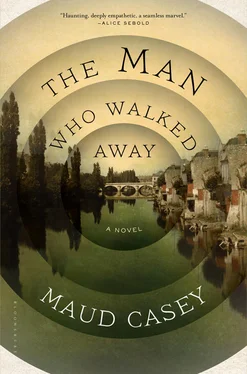When he walks, he is no longer only moving toward death; he is no longer only dying. The gift of life is in his bones. The birds in the sky above him are utterly bird, the shadows cast by leaves totally and completely shadow. Their beauty is indisputable. They are . They are here. He is . He is here . Ripe fruit falls to the ground at his feet, offering itself to him. From the riverbeds comes the song of frogs. When Albert walks, he has been kissed. When he walks, his existence is complete and his body is divine; he is elemental as the sky drenched with sun, then infused with red dusk, then night-dark, then sun-bright again.
He walks for days without stopping, without eating, without sleeping, in order to feel the gift of astonishment.
He drifts on the fringes of days where a fog mutes the tick-tock, tick-tock others adhere to so rigorously. Is it time to go? What time is it? Why is there never enough time? These are not his questions. When he walks, days and weeks and months are nothing but scurrilous rumor. He trammels winter, spring, summer, fall, as if they were idle gossip.
Where does the time go? Vanished into the woods between Bordeaux and Toulouse? Splashed into the deep black water between Marseille and Blida? Flittered into the sky with the sparrows between Geneva and Strasbourg? Is it somewhere on the side of the road from Vienna to Budapest? It is such-and-such-a-day, people say to him. We are this day. We are here on the great clock of history. Albert, here you are, in this moment, right here , can’t you see?
No, he cannot. The world is enamored of time — its shapely hours, its miraculous minutes, its svelte and speedy seconds. The entire world, that is, except for Albert.
This is how it goes, how it has always gone: He begins to fade and then a terrible thirst comes upon him and his body is overcome with restlessness. He must drink water, lots of water. Six, maybe ten glasses of water in a row, and still he is thirsty. He sweats through his clothes and he trembles, filled with a terrible itch. There is a ringing in his ears and in his legs, his hips and his groin; it crescendos, until it becomes a song. He’s crescendoed all over Europe: behind the black blots of fir woods near stone cattle tracks; enveloped in the smell of moss and damp stone behind a cathedral; in the dark marshy open, all of nature invaded by a fog.
What will you do? The urge to walk is the answer to this question. It falls upon him and lifts him into heavenly oblivion until he disappears, and when he reappears he is walking again, somewhere else entirely, the sky darkening toward night when before the sun was just rising. The terrible itch gone.
What terrible itch?
Then there are the times when his body begins to fade and that terrible thirst comes upon him, when his body is overcome with restlessness and he is still thirsty even after he has drunk lots of water, and there is a ringing in his ears, and the terrible itch finds its way into his cock, which he prefers to refer to as his beautiful instrument. And so he plays his beautiful instrument. Always gently, as if he is greeting it — hello, yet another escapade ! The buzz in his legs, his hips, and his groin, he achieves a steady cadence, holding the buzz inside, allowing the song to take shape. Always privately — he is a decent man! Behind this copse of trees or that one, and once or twice behind the cathedral, where it smelled of damp stone and moss. The song crescendos, an especially glorious crescendo, singing back the roots of his bristly hair, the slope of his long, strange nose, his thin mustache, his unusually large head, his absurdly large ears, his exquisitely muscular calves, his carefully trimmed toenails, and his beautiful feet. For these beautiful feet he seeks out clumps of the softest moss, luminous and blue, to pad his mended shoes.
Somewhere outside of Limoges, a man gives him a pair of shoes and he puts his old shoes to rest, burying them under a tree. He bows his head. “Hail Mary, full of grace,” he says the way he dimly remembers his mother did long ago, before Albert was left all alone with only this silence waiting to be filled.
Please let it be filled .
And when he walks, it is, fleetingly. For years, Albert’s journeys have been fleeting illuminations along a pitch-dark trail: he discovers himself at the Baths of Urhasch in the Canton of Appersell, watching a wrestling match on the side of the road surrounded by ruddy-faced men; he wakes to find himself lying on the platform of the Paris train station, light glinting through the roof, illuminating his body and the metal face of a train spewing steam as it pulls in and, soon, all around him, the feet of bustling people just arrived.
But when he stops.
When he stops, out of the mist near the Société Française in Berlin where he is given papers and new shoes, the face of an enormous dog, followed quickly by the body of the same enormous dog, tumbles him to the ground. The bite is painful, but worse is the man’s face hovering above him. “You must be hurt,” the face says. It always hurts , Albert wants to say, but why begin a sentence he can’t finish? The look on the man’s face says it must be a problem of translation; he is right, though Albert understands German well enough. How can he be expected to make himself understood in any language when the words trail off from public square to public square, if whole pages are missing from his life?
When he stops, sometimes he discovers himself at home where the mice dance in the kitchen and his friend Baptiste’s father forbids Baptiste from speaking to him, where the bedclothes are tattered and moldy and the neighborhood women who once brought him food turn their backs on him as though he is an utter stranger.
When he stops, having discovered himself in this public square or that one, his arms and legs ache. For a fleeting moment, glorious relief: My body is still here! That he has woken up in Lausanne in the same body as in Toulouse! That he has the same legs in Dortmund as in Liechtenstein! It is a miracle to wake up somewhere else entirely, still him. But then the tick-tock hammer of time smashes down again. Fascination? Vanished. Magnificence? Vanished. Escapades? No more. When he stops, it is as if he never existed at all.
This morning, when he discovers himself in a public square, he is an anonymous hunk of rock rumbled forth from the earth, severed from its molten lava past. “It appears. .” and, “It seems. .” There are no finished sentences. “Fascinating!” he says, though it is not fascinating, not fascinating at all. He is not here . He is not, he is not, he is not. He is nowhere. It is as if the gift of astonishment never existed at all.
What gift?
There are no stars, only the moon disappearing into the morning as the townspeople wake from murmuring dreams into the smell of bread and a day that will be whittled out of hours whittled out of minutes. There is an ache in his thighs, in his back; still, even as he appears he is disappearing like the moon but unlike the moon he is not beautiful, he is only disappearing.
“Have you lost something?” A woman with skin like an aging peach — a soft, pink sag and fuzzy down along her jaw — bends to put a bowl of milk at the base of the monument to some great general. She smells of a life lived outside without soap, of hay and rich soil. Albert inhales deeply, narrowing his focus until he is the smell itself, until the question— Have you lost something? — disappears.
“They’re starved,” the woman says when Albert says nothing. He is grateful she doesn’t require him to have a conversation, that she is happy to speak both parts. She wipes her hands on her skirts, nodding toward the cats who appear to be slipping out of the cracks in the cobblestones. They canter toward the milk, slithering between Albert’s legs, flicking their tails.
Читать дальше












